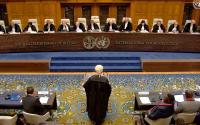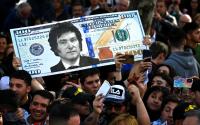19 February 2005 The Independent
For the Bush administration, global warming and climate change have so far been the great unmentionables, topics that interfered with the march towards the promised land of the perfect free market.
Many say that the discovery by scientists that there is an unequivocal link between man-made greenhouse gases and a dramatic heating of the Earth's oceans, as reported to the American Association for the Advancement of Science, is unlikely to change that. "There's a denial of the science by the upper levels [of the administration]," a spokesman for the Sierra Club said.
For "upper levels" read the President and vice-president. Their links with energy companies are well known and oil, coal and other natural resources companies have been prime contributors to campaign coffers.
In her book It's My Party Too, Christine Whitman, who resigned as head of the Environmental Protection Agency in 2003, wrote of the "obsession" of many in the energy industry and the Republican party "with doing away with environmental regulation". But there is also an ingrained and profoundly American opposition to the notions that climate change is harmful, that humans cause it, and that humans can do much about it.
A typical exponent of that school is Fred Singer, founder of the think-tank the Science and Environmental Policy Project. Since 1979, he says, the global climate has - if anything - cooled slightly, and what warming that exists is primarily an urban heat effect. "Climate keeps changing all the time," he says. "The fact that climate changes is not in itself a threat, because, obviously, in the past human beings have adapted to all kinds of climate changes."
This approach is music to the ears of many American economic and business theorists. To accept that climate control is caused by humans and harmful means that humans must change their ways. That in turn implies more regulation, anathema to Bush's administration.
That philosophy overlaps with another American economic tenet; the free market, left to its devices, can solve every problem. Natural economic forces, of price and supply and demand, will induce humans to change their ways.
But attitudes may be starting to change. While the White House has done next to nothing to tackle emissions, states such as California are taking matters into their own hands. And on Capitol Hill, the Democratic senator Joe Lieberman and his Republican colleague John McCain are pushing to tighten emissions controls. It is likely to fail again but support is growing.
Even at the White House, optimists detect subtle signs of change. Maybe it is the disaster movie The Day after Tomorrow, perhaps it has been irrefutable evidence that change is already happening, in especially sensitive areas such as the shrinking polar icecaps.
"We care about the climate," Mr Bush said this week, on the eve of his trip to Europe where global warming will be a major issue. Stephen Hadley, the White House national security adviser, says the US is already "doing a lot with Europe" on climate change research, to make a contribution "in a positive direction".
Undoubtedly, those are in part sops to Europeans who still regard the 43rd President as "the toxic Texan". Whether US officials will accept the science linking the planet's warming to human activities is quite another matter.
AAA CONFERENCE IN BRIEF
Hubble scientists compared with artists of Old West
Images of stars and galaxies taken by the Hubble space telescope fall into the Romantic landscape tradition that inspired the "America sublime" artists of the 19th century.
An art historian has found similarities in the way American painters depicted the beauty of the Old West with the subjective decisions made by the astronomers to form Hubble pictures.
The Hubble records optical images but the colours have to be processed from black-and-white pictures with filters sensitive to different frequencies of the spectrum. But astronomers trying to depict space as realistically as they can have to make subjective choices on contrast, composition and colour, Elizabeth Kessler, of the University of Chicago, told the American Association for the Advancement of Science.
"The Hubble images are part of the Romantic landscape tradition" she said, pioneered by the likes of Moran and Albert Bierstadt.
David DeVorkin, of the Smithsonian Institution, said: "Just as 19th-century artists accompanied ... exhibitions to persuade of the greatness of the West, the space telescope images are doing that for space."
Saliva test can show whether children will need fillings
A saliva test has been developed to tell parents whether their children are likely to need fillings.
It is one of a number of research projects that tests saliva samples for a range of medical disorders, including cancer and exposure to toxic substances. Scientists believe advances in the technology of medical testing will soon mean saliva will replace blood and urine as the body fluid most likely to be used to diagnose many diseases.
Professor Paul Denny, of the University of Southern California, developed the test. He said: "A simple test can predict whether children will develop cavities, how many they will develop and which teeth are most vulnerable."






